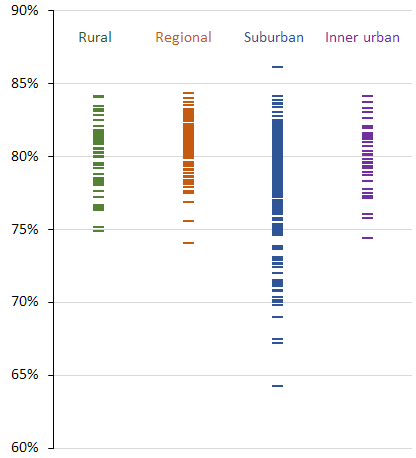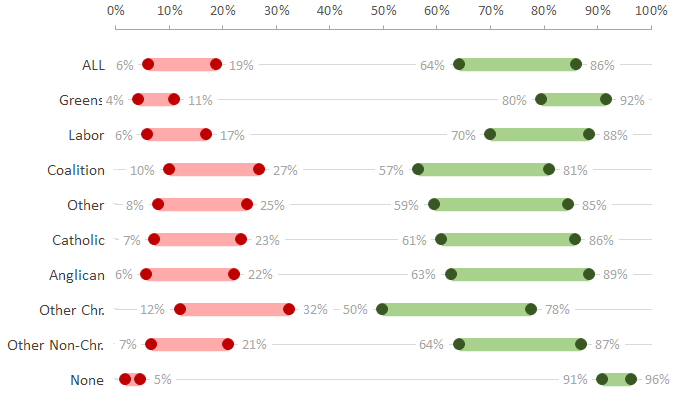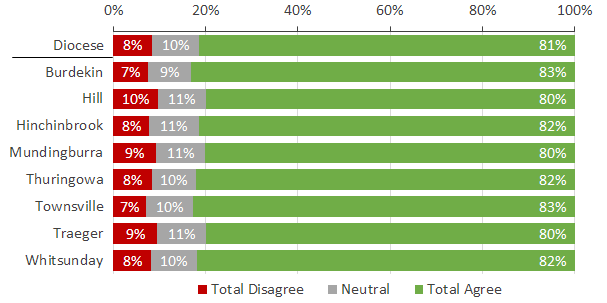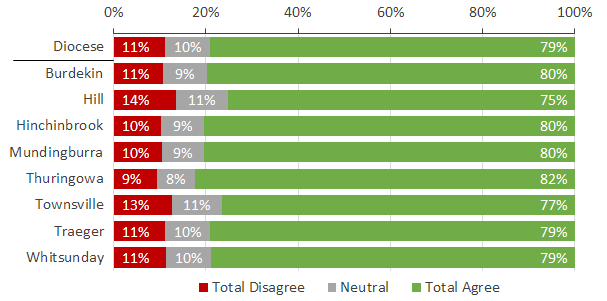Overwhelming voter support for VAD across Australia
Voters across Australia overwhelmingly favour voluntary assisted dying (VAD) law reform, analysis of VoteCompass data collected at the 2019 federal election shows.
Based on a total sample size of well over half a million Australian voters (N = 544,494), 79% of voters favour reform — representing 13.2 million of the 16.7 million Australian voters — with just 10% opposed.
Voters who are most likely to change their first preference at the next election should their MP oppose their stance on VAD are those who Strongly Agree or Strongly Disagree (i.e. excluding 'mere' Agree or Disagree). Across Australia on average, Strongly Agree voters are clearly in the majority at 58%, with Strongly Disagree at just 6%. That is, Strongly Agree voters outnumber Strongly Disagree voters by a sweeping margin of 10.6 times.
Australia: Summary table
Statistical tables and individual PDF reports containing charts are available for each State and Territory and each of their electoral Districts. (Individual districts are not available for the NT due to some modest sample sizes.)
To go to a more detailed State/Territory page, click its name.
| Electorate | N | Strongly disagree | Disagree | Neutral | Don't know | Agree | Strongly agree | Total disagree | Total agree | 'Strongly' ratio * |
|---|---|---|---|---|---|---|---|---|---|---|
| AUSTRALIA | 544,494 | 6% | 4% | 8% | 3% | 21% | 58% | 10% | 79% | 10.6 x |
| Australian Capital Territory | 25,565 | 5% | 4% | 8% | 3% | 22% | 58% | 9% | 80% | 10.9 x |
| New South Wales | 155,819 | 7% | 4% | 8% | 4% | 21% | 56% | 11% | 77% | 8.5 x |
| Northern Territory | 4,557 | 5% | 4% | 8% | 4% | 16% | 64% | 9% | 79% | 12.0 x |
| Queensland | 106,998 | 5% | 4% | 8% | 3% | 21% | 59% | 9% | 80% | 11.9 x |
| South Australia | 42,086 | 5% | 4% | 8% | 4% | 21% | 58% | 9% | 79% | 11.0 x |
| Tasmania | 17,650 | 5% | 4% | 8% | 3% | 21% | 58% | 9% | 80% | 11.7 x |
| Victoria | 137,188 | 5% | 4% | 8% | 3% | 21% | 60% | 9% | 80% | 11.9 x |
| Western Australia | 54,631 | 5% | 4% | 7% | 3% | 20% | 60% | 9% | 80% | 11.3 x |
* 'Strongly' ratio: Strongly Agree voters outnumber Strongly Disagree voters by a factor of...
Australia: Preferred party table
| Greens | Labor | Coalition | Other | |||||||||
| Electorate | Disagree | Neutral | Agree | Disagree | Neutral | Agree | Disagree | Neutral | Agree | Disagree | Neutral | Agree |
| AUSTRALIA | 6% | 6% | 88% | 9% | 8% | 83% | 15% | 12% | 73% | 14% | 11% | 74% |
| ACT | 6% | 6% | 88% | 9% | 8% | 83% | 16% | 13% | 71% | 14% | 11% | 75% |
| NSW | 7% | 7% | 86% | 10% | 9% | 80% | 16% | 13% | 71% | 16% | 12% | 72% |
| NT | 6% | 6% | 89% | 8% | 8% | 84% | 14% | 11% | 75% | 13% | 11% | 76% |
| Queensland | 6% | 6% | 89% | 8% | 8% | 84% | 13% | 11% | 76% | 13% | 11% | 76% |
| SA | 6% | 6% | 88% | 9% | 8% | 83% | 14% | 12% | 74% | 14% | 11% | 75% |
| Tasmania | 6% | 6% | 88% | 8% | 8% | 84% | 16% | 12% | 72% | 13% | 11% | 76% |
| Victoria | 6% | 6% | 89% | 8% | 7% | 85% | 14% | 12% | 74% | 14% | 11% | 75% |
| WA | 6% | 6% | 88% | 8% | 8% | 84% | 14% | 11% | 75% | 14% | 11% | 75% |
Australia: Religion table
| Catholic | Anglican | Other Christian | Other Non-Christian | None | |||||||||||
| Electorate | Disagree | Neutral | Agree | Disagree | Neutral | Agree | Disagree | Neutral | Agree | Disagree | Neutral | Agree | Disagree | Neutral | Agree |
| AUSTRALIA | 13% | 11% | 76% | 10% | 9% | 81% | 22% | 16% | 64% | 10% | 9% | 81% | 3% | 3% | 95% |
| ACT | 13% | 11% | 76% | 10% | 9% | 81% | 20% | 14% | 66% | 10% | 9% | 81% | 2% | 3% | 95% |
| NSW | 14% | 11% | 75% | 13% | 10% | 77% | 23% | 15% | 62% | 11% | 9% | 80% | 3% | 3% | 94% |
| NT | 12% | 10% | 78% | 9% | 8% | 83% | 21% | 15% | 64% | 9% | 8% | 82% | 2% | 3% | 95% |
| Queensland | 12% | 10% | 78% | 8% | 8% | 84% | 22% | 15% | 63% | 10% | 9% | 82% | 3% | 3% | 95% |
| SA | 13% | 11% | 76% | 9% | 8% | 82% | 22% | 15% | 63% | 9% | 8% | 82% | 3% | 3% | 94% |
| Tasmania | 14% | 11% | 75% | 10% | 9% | 82% | 25% | 16% | 59% | 9% | 8% | 84% | 3% | 3% | 94% |
| Victoria | 12% | 10% | 77% | 9% | 8% | 83% | 20% | 14% | 66% | 10% | 9% | 82% | 2% | 2% | 95% |
| WA | 13% | 11% | 77% | 8% | 8% | 84% | 22% | 15% | 63% | 10% | 9% | 81% | 3% | 3% | 95% |
Clear majority support in every electoral District
VAD law reform is a State rather than federal issue. Therefore, VoteCompass results were analysed by every State and Territory District (not federal Divisions) across the nation.
Support for VAD law reform was in a significant majority in every District, ranging from 64% to 86%, with a tiny minority of opposition ranging from 6% to 19%. (Note: Sample sizes for some NT electorates were too small to report official individual results, but nevertheless their results fell within the range of all other Districts.)
Support for VAD across Districts was similar amongst rural, regional and inner urban electorates. Suburban electorates had a similar mean but greater range. Suburban electorates with high proportions of recent migrants (and higher religiosity) had lower average support for VAD, though all still returned a significant majority of support for VAD.
In addition, Strongly Agree (i.e. without Agree) was in the majority in almost all (401 of the 415) electoral Districts.

Distribution of percent VAD support by electoral District type
Support across the political and religious spectrums
Very large majorities in favour of VAD exist across the political spectrum from Greens (88%), Labor (83%) and Liberal (73%), to minor party and indepdendents (74%) voters. (Party is the political party the respondent intended to or gave first preference in the House of Representatives at the 2019 federal election.)
Very large majorities in favour also exist across the religious spectrum, including three quarters (76%) of Catholic, four out of five (81%) Anglican and Other-non-Christian (81%) and most no-religion (95%) Australians. Clergy opposing VAD law reform do not represent the majority of their flocks.
Amongst non-religious Australians — the fastest-growing 'religion' segment — opposition to VAD law reform was almost non-existent: between just 2% and 5%.

Range of all electoral District results in support of VAD (green) and opposition (red) by political party and religion
Opposing clergy don't represent voters' views
Clergy opposing VAD law reform don't represent the views of their diocesan voters. For example, the Australian Catholic Bishops Conference has appointed the Bishop of Townsville, Tim Harris, as its delegate on VAD. Yet support for VAD is very high across Bishop Harris' own diocese of Townsville, which includes the electoral districts of Burdekin, Hill, Hinchinbrook, Mundigburra, Thuringowa, Townsville, Traeger and Whitsunday.

Support for VAD is very high amongst all voters across the Catholic diocese of Townsville, with four out of five (81%) supporting reform, and just one in twelve (8%) opposed.
Bishop Harris has claimed that with around 80,000 Catholics in his diocese, writing to Queensland MPs to oppose reform was "the right thing to do". However, he seems to be unaware that four out of five (79%) of his own flock support the reform, with just one in nine (11%) agreeing with his opposed stance.

Support for VAD is very high amongst Catholic voters in the Catholic diocese of Townsville, contrary to Bishop Harris' assumptions.
Summary
This detailed and comprehensive analysis reveals an undeniably strong level of nation-wide support for VAD law reform across all electoral Districts in Australia. State governments are right to construct and enact law reform to permit VAD, representing the clear will of their electorates.
Further, attitudes are similarly favourable towards VAD in the Territories, revealing that it's time for the Federal Parliament to annul its Kevin Andrews Act that prevents the Territories from legislating VAD law and treating Territorians like second-class citizens.
Detailed tables and charts are available above. The study methodology is described here.
For further information, contact Penny Hackett on +61 (0)425 231 786.